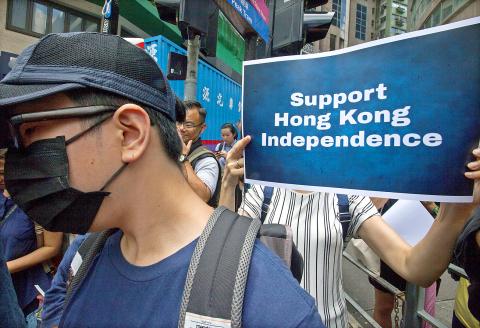Authorities in Hong Kong yesterday took an unprecedented step to quash separatist voices by banning a political party that advocates independence for the territory on national security grounds.
Hong Kong Secretary for Security John Lee (李家超) said that the Hong Kong National Party (HKNP) would be prohibited from operation as of yesterday.
At a briefing, Lee said the party led by 27-year-old Andy Chan (陳浩天) posed a threat to national security because it wants Hong Kong to be an independent republic and has taken steps to push this agenda.

Photo: EPA-EFE
Lee cited as examples alleged plans by the party to recruit members and infiltrate schools to promote its views.
Lee said the party also “spreads hatred and discrimination against mainlanders in Hong Kong.”
The HKNP had also said it would not stop at force, Lee added, but he conceded it had never committed violence and that Chan had advocated non-violence.
Chan had no immediate comment on the decision.
The ban cites a national security law that has not been invoked since 1997. It is likely to raise further questions about Beijing’s growing influence in the former British colony.
The perception that Beijing is reneging on its promise of semi-autonomy and eroding Hong Kong’s free elections and freedom of speech is helping fuel a rising generation of young activists calling for greater autonomy, if not outright independence.
The UK Foreign Office said in a statement that it was “concerned” at the move, noting it was the first such ban since the handover.
“The UK does not support Hong Kong independence, but Hong Kong’s high degree of autonomy and its rights and freedoms are central to its way of life, and it is important they are fully respected,” it said.
In Beijing, the State Council’s Hong Kong and Macau Affairs Office expressed support for the ban, saying in remarks carried by Xinhua news agency that the move was necessary to protect China’s national security.
An office spokesman said China fully supported punishing what Xinhua described as “any acts that jeopardize national security,’” and that Beijing has “zero tolerance for any organizations preaching ‘Hong Kong independence’ or engaging in activities of splitting the country.”
Maya Wang (王松蓮), a researcher with Human Rights Watch in Hong Kong, said the ban sets a dangerous precedent.
“The banning of the Hong Kong National Party is a milestone in the Beijing and Hong Kong governments’ assault on Hong Kong’s freedoms,” Wang said.
“This justification sets a dangerous precedent, where more non-violent pro-democracy political groups may be similarly banned,”’ Wang wrote in an e-mail.
Additional reporting by AFP

LONG FLIGHT: The jets would be flown by US pilots, with Taiwanese copilots in the two-seat F-16D variant to help familiarize them with the aircraft, the source said The US is expected to fly 10 Lockheed Martin F-16C/D Block 70/72 jets to Taiwan over the coming months to fulfill a long-awaited order of 66 aircraft, a defense official said yesterday. Word that the first batch of the jets would be delivered soon was welcome news to Taiwan, which has become concerned about delays in the delivery of US arms amid rising military tensions with China. Speaking on condition of anonymity, the official said the initial tranche of the nation’s F-16s are rolling off assembly lines in the US and would be flown under their own power to Taiwan by way

OBJECTS AT SEA: Satellites with synthetic-aperture radar could aid in the detection of small Chinese boats attempting to illegally enter Taiwan, the space agency head said Taiwan aims to send the nation’s first low Earth orbit (LEO) satellite into space in 2027, while the first Formosat-8 and Formosat-9 spacecraft are to be launched in October and 2028 respectively, the National Science and Technology Council said yesterday. The council laid out its space development plan in a report reviewed by members of the legislature’s Education and Culture Committee. Six LEO satellites would be produced in the initial phase, with the first one, the B5G-1A, scheduled to be launched in 2027, the council said in the report. Regarding the second satellite, the B5G-1B, the government plans to work with private contractors

‘NARWHAL’: The indigenous submarine completed its harbor acceptance test recently and is now under heavy guard as it undergoes tests in open waters, a source said The Hai Kun (海鯤), the nation’s first indigenous defense submarine, yesterday began sea trials, sailing out of the Port of Kaohsiung, a military source said. Also known as the “Narwhal,” the vessel departed from CSBC Corp, Taiwan’s (台灣國際造船) shipyard at about 8am, where it had been docked. More than 10 technicians and military personnel were on deck, with several others standing atop the sail. After recently completing its harbor acceptance test, the vessel has started a series of sea-based trials, including tests of its propulsion and navigational systems, while partially surfaced, the source said. The Hai Kun underwent tests in the port from

MISSION: The Indo-Pacific region is ‘the priority theater,’ where the task of deterrence extends across the entire region, including Taiwan, the US Pacific Fleet commander said The US Navy’s “mission of deterrence” in the Indo-Pacific theater applies to Taiwan, Pacific Fleet Commander Admiral Stephen Koehler told the South China Sea Conference on Tuesday. The conference, organized by the Center for Strategic and International Studies (CSIS), is an international platform for senior officials and experts from countries with security interests in the region. “The Pacific Fleet’s mission is to deter aggression across the Western Pacific, together with our allies and partners, and to prevail in combat if necessary, Koehler said in the event’s keynote speech. “That mission of deterrence applies regionwide — including the South China Sea and Taiwan,” he